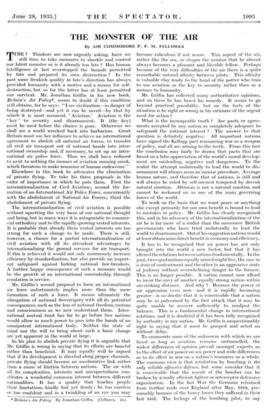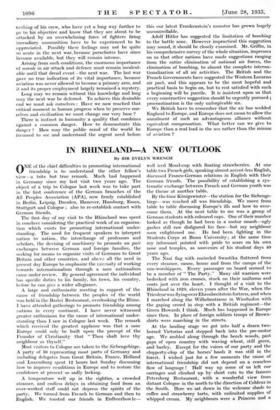THE MONSTER OF THE AIR
By AIR COMMODORE P. F. M. FELLOWES
TIME ? Thinkers are now urgently asking, have we still time to take measures to shackle and control our latest monster or is it already too late ? Has human intelligence at last overstepped the bounds permitted by fate and prepared its own destruction ? In the past some freakish quality in fate's direction has always provided humanity with a motive and a means for self- destruction, but so far the latter has at least permitted our survival. Mr. Jonathan Griffin in his new book, Britain's Air Policy*, seems to doubt if this condition still obtains, for he says : " I see civilization—in danger of being destroyed—and yet it can be saved—by that by which it is most menaced, ' Aviation.' Aviation is the ' key' to security and disarmament. It (the key) must be used before the chance is gone. Otherwise we shall see a world wrecked back into barbarism. Great Britain must use her influence to achieve an international agreement to abolish all national air forces, to transfer all civil air transport out of national hands into inter- national ownership and, if necessary, to set up an inter- national air police force. Thus we shall have reduced to next to nothing the menace of aviation running amok, which threatens to make nonsense of human endeavour."
Elsewhere in this book he advocates the elimination of private flying. To take his three proposals in the order of importance in which he puts them. First the internationalization of. Civil Aviation ; second the for- mation of an International Air Police Force, concurrently with the abolishment of National Air Forces; third the abolishment of private flying.
The internationalization of civil aviation is possible without upsetting the very basis of our national thought and being, but in many ways it is antagonistic to commer- cial orthodoxy and to the rapidly-growing vested interests. It is probable that already theSe vested interests are too strong for such a change to be made. There is still, however, a chance for a partial internationalization of civil aviation with all its attendant advantages by internationalizing the ground services for air transport. If this is achieved it would not only enormously increase efficiency by standardization, but also provide an import- ant safeguard against lurking national law-breakers. A further happy consequence of such a measure would be the growth of an international comradeship through emulation in service.
Mr. Griffin's second proposal to form an international air force unfortunately implies more than the mere formation of such a force. It means ultimately the abrogation of national Sovereignty with all its potential consequences, such as the loss of national freedom, custom and consciousness as we now understand them. Inter- national mutual trust has far to go before free nations would allow so much power to pass into the hands of an omnipotent international body. Neither the state of mind nor the will to bring about such a basic change are yet apparent in the world at large.
In his plan to abolish private flying it is arguable that Mr. Griffin is wrong in saying that its effects are baneful rather than beneficial. It may equally well be argued that if its development is directed along proper channels, private flying should become an ameliorative link rather than a cause of friction between nations. The air with all its complexities, interests and unexpectedness con- stitutes a wonderful common interest between different nationalities. It has a quality that teaches people their limitations, kindly but yet firmly; be too careless or too confident and in a twinkling of an eye you may - * Britain's Air Policy. By Jonathan Griffin. (Gollancz. 5s.) become ridiculous if not worse. This aspect of the air, rather like the sea, so shapes the aviator that he almost always becomes a pleasant and likeable fellow. Perhaps because of the very difficulties of the air there is a quite remarkable natural affinity between pilots. This affinity is valuable clay ready to the hand of the potter who tries to use aviation as the key to security rather than as a menace to humanity.
Mr. Griffin has collected many authoritative opinions, and on these he has based his remedy. It seems to go beyond practical possibility, but on the facts of the situation is he right or wrong in his estimate of the urgent need for action ?
What is the inescapeable truth ? Are pacts or agree- ments accepted by any nation as completely adequate to safeguard the national interest ? The answer to that question is definitely negative. All important nations have signed the Kellogg pact renouncing war as a weapon of policy, and all are arming to the teeth. From this fact the conclusion may fairly be drawn that pacts that are based on a false appreciation of the world's moral develop- ment are misleading, negative and dangerous. To the realist the attempt unilaterally to lead the world to dis= armament will always seem an unwise procedure. Average human nature, and therefore that of nations, is still and- will always be ruled by self-interest tempered by decent natural emotion. Altruism is not a natural emotion and cannot be reckoned on as one of the main governing forces of the world.
To work on the basis that we want peace or anything else except primarily for our own benefit is bound to lead to mistakes in policy. Mr. Griffin has clearly recognized this, and in his advocacy of the internationalization of the air he is far more of a realist than the successive British governments who have tried unilaterally to lead the world to disarmament. Out of his suggestion nations would at least obtain some direct benefit in economy and efficiency.
It has to be recognized that air power has not only brought into the world a new factor, but that it has altered the relations between nations fundamentally. In the past, two equal nations equally armed might live, the one in a state of contentment and the other in an aggressive state of jealousy without overwhelming danger to the former. This is no longer possible. A nation cannot now afford to incur the envy of another equally strong nation within air-striking distance. And why ? Because the power of air aggression even now—and it is rapidly becoming greater—is so drastic that it is conceivable that a nation may be so pulverized by the first attack that it may be quite unable to recover sufficiently to readjust the balance. This is a fundamental change in international relations, and it is doubtful if it has been fully recognized by authority in any nation. Mr. Griffin is unquestionably right in saying that it must be grasped and acted on without delay.
To enumerate some of the unknowns with which we are faced as long as aviation remains untramelled, the widest differences of opinion prevail amongst experts as to the effect of air power on sea power and wide differences as to its effect in war on a nation's resources as a whole. The common view is that retaliation by bombing is the only reliable offensive defence, but some consider that it is conceivable that the morale of the bomber can be broken by a really efficient fighter or intercepter defensive organization. In the last War the Germans refrained from further raids over England after May, 1918, pre- sumably because of the heavy losses they suffered in their last raid. The feelings of the bombing- pilot, to say nothing of his crew, who have yet a long way further to go to his objective and know that they are about to be attacked by an overwhelming force of fighters firing incendiary ammunition have to be experienced, to be appreciated. Possibly these feelings may not be quite so acute in the next war, because parachutes have since become available, but they will remain intense.
Arising from such conditions, the enormous importance of morale in air attack and defence must remain incalcul- able until that dread event—the next war. The last war gave no true indication of its vital importance, because aviation was never allowed to become a primary arm, and it and its proper employment largely remained a mystery.
Long may we remain without this knowledge and long may the next war be deferred. To achieve this desirable end we must ask ourselves : Have we now reached that critical moment in human progress when to preserve our- selves and civilization we must change our very base ?
There is instinct in humanity a quality that combines against a common danger. How to demonstrate this dangcr ? How may the public mind of the world be focussed to see and understand the urgent need before this our latest Frankenstein's monster has grown hugely uncontrollable.
Adolf Hitler has suggested the limitation of bombing to the battle zone. However impractical this suggestion may sound, it should be closely examined. Mr. Griffin, in his comprehensive survey of the whole situation, impresses on us that other nations have made suggestions ranging from the entire elimination of national air forces, the elimination of bombing, to almost the complete interna- tionalization of all air activities. The British and the French Governments have suggested the Western Locarno air pact, and this appears to be the most hopeful and practical basis to begin on, but to rest satisfied with such a beginning will be puerile. It is insistent upon us that every constructive suggestion should be urgently pursued ; procrastination is the only unforgivable sin.
We British have to remember that the air has wedded England to Europe, and Europe does not mean to allow the annulment of such an advantageous affiance without equivalent compensation. What better can we give to Europe than a real lead in the use rather than the misuse of aviation ?







































 Previous page
Previous page